Gambling has always been something that both fascinates and infuriates me.
Having been born into a normal, working class family, I have never and probably will never be able to experience the thrill of a high-stakes gambling bout. At the same time, I’m not sure if I’d ever want to – after all, gambling is called the devil’s sport for a reason. Once you’ve had a taste, it’s hard to stop yourself from plunging in again and again, until, finally, you’ve given up everything in the pursuit of the next big win. Far too many people have fallen prey to this for me to view gambling with anything but suspicion.
Nobuyuki Fukumoto certainly seems to share my suspicion. He has built his entire career on gambling stories, but it’s not like he glorifies it. Instead, he shows us the dirty, realistic side of gambling – and in Kaiji, a further, revolutionary thread emerges.
At it’s core, gambling is a bourgeois sport, with large amounts of capital needed to participate in high-stakes games, effectively limiting working class participants from ever winning anything worthwhile. As a result, gambling is often the sport of those who have more money than sense, can afford to bet large amounts and lose at the same time, which is a fact that Kaiji doesn’t shy away from. The ones who have the capital in the series are the Heian Group, a giant conglomerate steeped in shady business deals and healthy links with the yakuza – not our working class heroes themselves. And in the second arc of the first season, the true nature of gambling is also revealed for the first time when Kaiji et al. find themselves as participants in a deadly ‘human derby’, with nameless, laughing members of high society betting on their lives. Most of the games going forward are also nearly always rigged in the favour of the house, the bourgeoisie, especially the Bog.
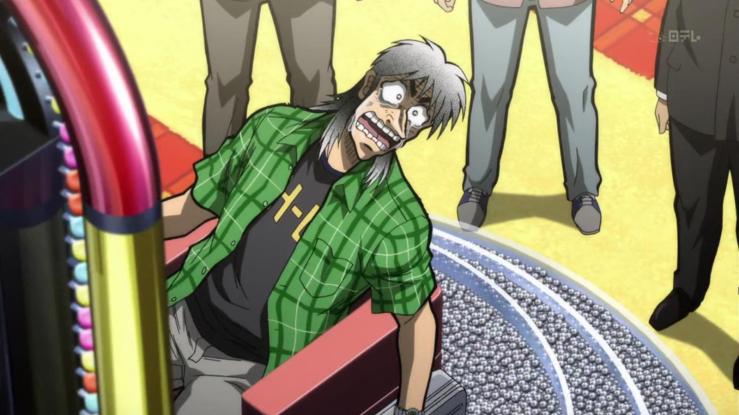
Even so, the majority of the series focuses less on this sinister, high society gambling than it does focus on the sad stories of working class people duped into gambling as a way out. Kaiji himself is the main example of this, as he chooses to participate in more and more dangerous gambles in an attempt to relinquish himself of his debt and reclaim his life from years of back-breaking labour. His situation is reminiscent of many in the modern world, particularly millennials who find themselves shouldered with more and more student debt in an ever-shrinking job market, leaving them with no choice but to take up multiple jobs or work overtime. In addition, Ishida is forced to participate in the ‘human derby’ despite being freed from the Espoir to clear his wife’s debts; Kotaro has no other choice but to challenge the Bog if he ever wants to be able to see his wife and daughter ever again; and Sahara chooses to risk his life than work a dead-end job for the rest of his life. In many of these cases, the characters are tricked by the ‘get rich quick’ allure of high-stakes gambling and therefore are somewhat pitiable, but at the same time it’s not like they have much choice – the exploitative nature of capitalism has backed these characters into a corner, whether it be through debt, poverty or disillusionment.
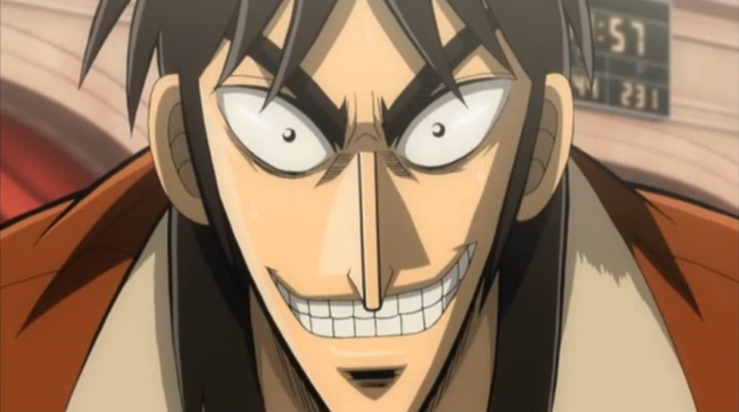
At the centre of this web of conspiracy and exploitation is our hero, Kaiji. From the get go, it’s clear that Kaiji is a brilliant man. He quickly learns how to rig the fixed rock-paper-scissors game to his advantage in the first season after an initial stumble, and then goes on to devise a brilliant plan to defeat the Bog in the second. Each gamble along the way tests his skills, but he always comes out on top thanks to his keen instincts and sharp intellect. Yet, Kaiji is, at the same time, a ‘bum’ – an exile from society who has never had the chance to show his worth. Having dropped out of high school, Kaiji was never able to find a steady job, a steady income, and therefore fully integrate into capitalism and consumer society. Because of this, Kaiji became angry at society, but had no way to channel his anger constructively, so resorted to vandalising cars and further reinforced his identity as a bum. It is only when he is given a way – gambling – that he is able to show his worth and channel his anger into something more constructive, if sketchy.
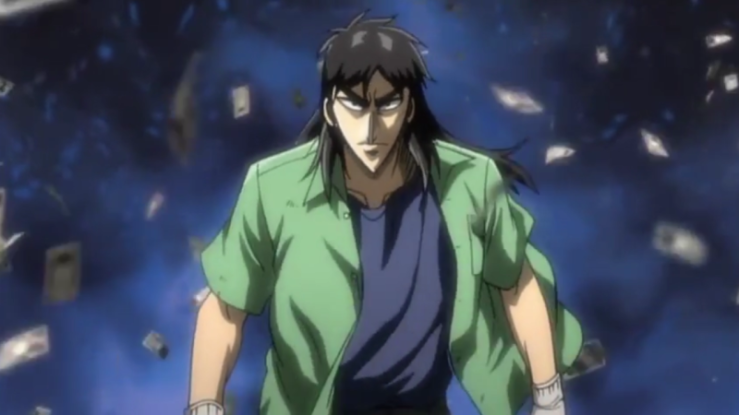
If Kaiji’s brilliance had been channelled by effective social movements directed at changing the society that he reacts against, then his life may have turned out much differently. This potential is brought to the forefront in season two, where Kaiji stages a mini-revolution in the forced labour camp against the fixed chinchirorin game and the crooked foreman. Kaiji organises his fellow downtrodden peers and educates them in the execution of his plan, instilling in them a feeling of comradeship that lasts throughout the events of the second season. This clearly shows Kaiji’s fantastic potential as a leader, and further informs the microcosmic structure of the chinchirorin game itself. Ootsuki, the foreman, clearly represents the bourgeoisie, as he holds all of the capital in the game, as well as rigs it in his favour. Against Ootsuki, Kaiji stages a revolution, and succeeds – through determination, hard work and comradeship. Thus, it is clear that Kaiji has a formidable intellect and leadership skills, but never has an opportunity to display these outside of gambling because of his identity as a worthless bum.
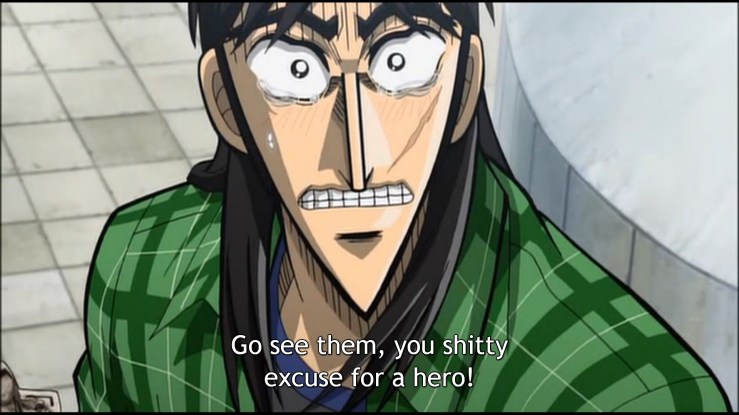
This inability to display his true worth outside of gambling is but one of the elements that makes up the tragedy of Kaiji’s character. Another major part of it comes in the destruction of Kaiji’s will by gambling and the class war. His identity as a ‘bum’, forced on him by society, is meant to prevent him from gaining class consciousness and rising up, along with the others deemed useless by society. Even within gambling, an arena in which he is able to show his true worth, he struggles against the bourgeoisie that operate the game. He is overcome with fear, desperation and hopelessness, and eventually ends up becoming addicted to gambling – just like the many others duped into it as a get-rich-quick scheme – as later arcs such as One Poker-hen affirm. Because of this addiction, he loses his revolutionary fervour as showcased by the chinchirorin game, merely intesifying the tragedy of his character. Kaiji could have become someone worthy of his potential, but in the end his war against the bourgeoisie in the gambling arena was too much for him to handle.
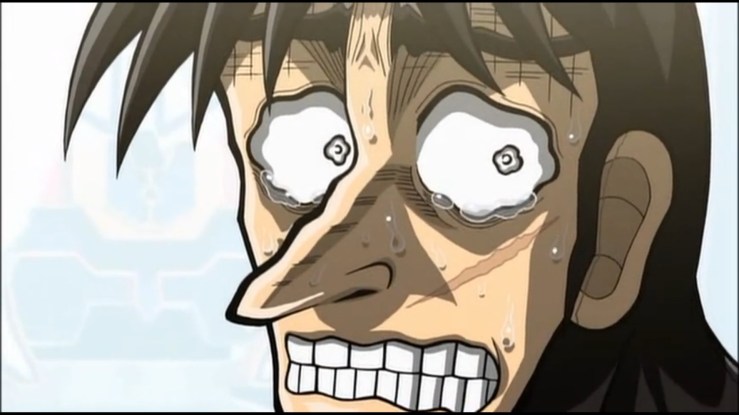
The bourgeoisie may have been instrumental in ensuring Kaiji’s downfall, but the series is surprisingly sophisticated in pinpointing who exactly is to blame. Hyodou is the one who is behind all of the events of the series, since he owns all of the capital, sets up many of the gambles, and pursues Kaiji relentlessly for his debt. He is supported, however, by a cast of petty bourgeoisie middle-managers who are quite clearly portrayed by Fukumoto to be mere tools in Hyodou’s schemes. Tonegawa is shown to be suffering as much as Kaiji as Hyodou jades him for his failure in the E-Card game, and this is cemented when he is forced to bow on hot coals. Ichijou, although full of contempt for Kaiji and his revolutionary nature, is also shown to be merely doing his job as a casino owner and fights for his life alongside Kaiji against Hyodou’s sadistic nature. We can’t help but feel sorry for these characters in the end, and this is further reinforced by the development of Kaiji’s relationship with them. At first, he views them as nothing but enemies, but by the end of their time together, he respects them as an equal and ultimately sympathises with them. In this sense, these petty bourgeois middle-manager elements have more in common with Kaiji, the working class hero, than they do with the bourgeois cariacture Hyodou, which highlights the true enemy in Kaiji‘s class war.
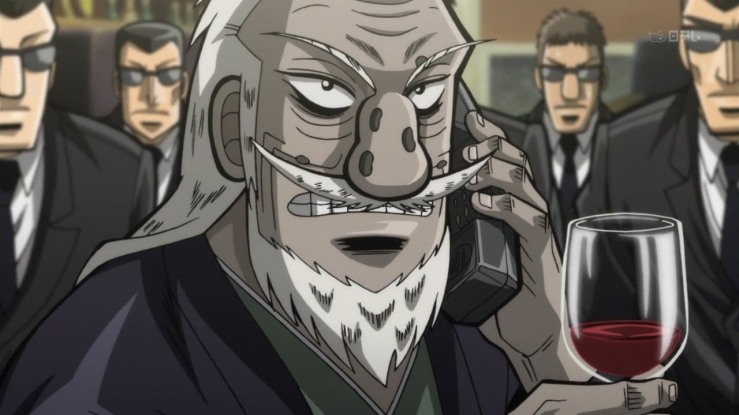
Alongside growing sympathy for the petty bourgeoisie of the series, Hyodou becomes more and more monstrous as to better occupy his position as the true antagonist of the series. At first, during the E-Card game with Tonegawa in season one, Hyodou doesn’t seem that menacing or antagonistic, merely making snide comments at Tonegawa for his lack of skill when playing Kaiji. The lottery gamble and making Tonegawa bow on hot coals hint at his monstrous nature, but it isn’t until Kaiji faces the Bog in season two when Hyodou shows his true colours. He acts out of contempt for his underlings, abuses them, and generally acts in a disgusting way befitting of a caricature of the bourgeoise. This caricature is extended when he drinks red wine, obviously a metaphor for blood, most likely the blood of the working class that he has spilt in order to obtain his position in society. A vampire-like metaphor is born here, because he drinks blood, but also because his character design – grey, sunken and grotesque – is reminiscent of Nosferatu and the classic, monstrous depiction of vampires.
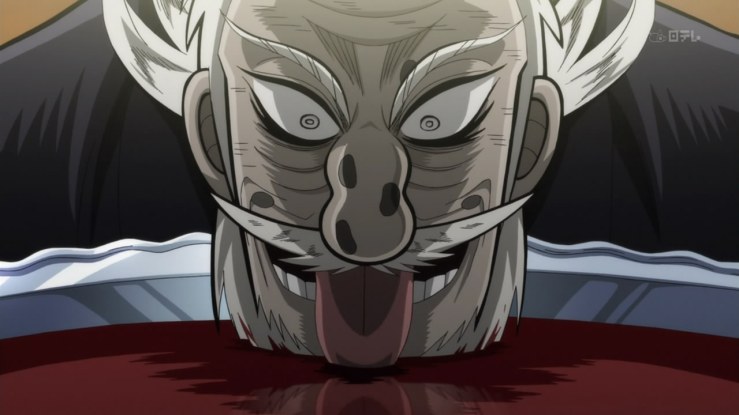
This works perfectly insofar as Hyodou is representative of a ‘monstrous’ side to the bourgeois, since vampires were in themselves partly born out of the superstitions around feudal lords and their lives at the dawn of industrialisation and capitalism. Living detached from the rest of society and with wealth that the proletariat could not even fathom the size of, the only way that they could be understood was as creatures not of this world. These feudal lords are not so different from the bourgeoisie in modern, capitalistic times, as they live lives that none of us could ever imagine, with wealth that we could never imagine, and indulging in hobbies that we could never dream of doing – such as gambling. As a result, Hyodou’s characterisation becomes more and more monstrous, displacing the other antagonists as the true antagonist of the series, because he is the true bourgeoisie and therefore the true enemy in the class war.
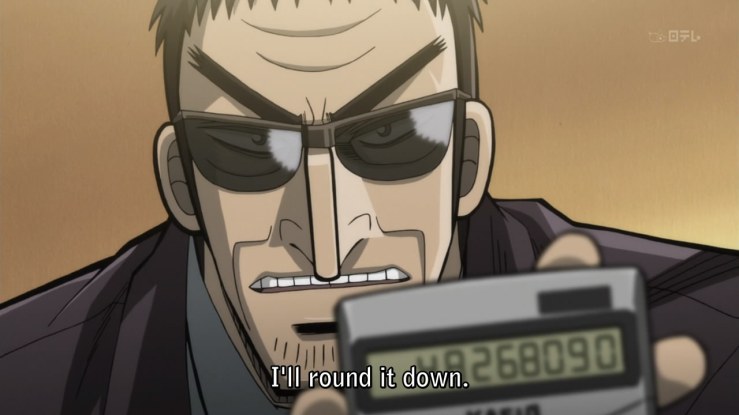
All of this is set behind a tapestry of faceless corporations and men in black. In reality, we have no idea as to the size of the scale of the Teiai Corporation, much like we can’t really fathom the immense scale of other conglomerates such as Coca-Cola, Apple or Unilever. Out of the many Teiai agents, we only really get to know one of them as a character – Endou – and even he remains relatively mysterious. Against this seemingly overwhelming and unquantifiable enemy force, Kaiji stands mostly alone – no wonder he is corrupted and succumbs to addiction, then.
This may seem discouraging at first, but in actual fact Fukumoto’s series is, at it’s core, an inspiring one. Despite these overwhelming odds, brave people like Kaiji are willing to stand up and risk everything, even if they are alone. The reality is that capitalism creates it’s own gravediggers, to paraphrase Marx, and that through the exploitation and alienation, people like Kaiji will always emerge. Kaiji as a series may seem at first like a simple gambling series, but in reality it maintains a keen revolutionary edge. Let’s learn some lessons from it, shall we?
This one was a bit more political, but I really wanted to go into detail analysing an aspect of Kaiji that I feel hasn’t been done justice. Anyone who isn’t familiar with Marxist terminology may be lost at times here, but I tried my best to explain things simply – hopefully that worked out. If not, let me down below or via Twitter. As always, I’ll see you again next week.

Great article, nicely put into words the most important layer of the show (IMHO), the capitalism criticism.
BTW, the evil corporation is called Teiai (帝愛, Empire of love, hahaha), not Heian.
LikeLike
Thanks for pointing out my mistake. I have absolutely no idea why I got the wrong name into my head!
LikeLike